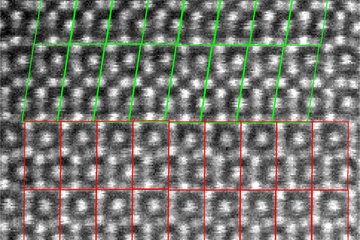All genres
1521.
Poster
Ab initio study of chemical and structural trends of Ti-based binary alloys. Materials Research Society fall meeting, Boston, MA, USA (2006)
1522.
Poster
Exploring the 5D configurational space of grain boundaries in aluminun: An ab-initio based multiscale analysis. MRS Fall Meeting, Boston, MA, USA (2006)
1523.
Poster
Probing of bulk band edges by STM: An ab initio analysis. Psi-k 2005 Conference, Schwäbisch Gmünd, Germany (2005)
1524.
Poster
Thermodynamic stability of the secondary structure of proteins: A DFT-GGA based vibrational analysis. Psi-k 2005 Conference, Schwäbisch Gmünd, Germany (2005)
1525.
Poster
Generalized Wannier Functions: An efficient way to construct ab-initio tight-binding orbitals for group-III nitrides. 6th International Conference on Nitride Semiconductors, Bremen, Germany (2005)
1526.
Poster
Temperature dependent properties of Ni-rich Ni2MnGa. Materials Research Society fall meeting, Boston, MA, USA (2005)
1527.
Poster
Thermodynamic stability of the secondary structure of proteins: A DFT-GGA based vibrational analysis. IPAM-Workshop: Multiscale Modeling in Soft Matter and Bio-Physics, Los Angeles, CA, USA (2005)
1528.
Poster
Ab-initio based multiscale calculations of low-angle grain boundaries in Aluminium. Materials Research Society fall meeting, Boston, MA, USA (2005)
1529.
Teaching
Application and Implementation of Electronic Structure Methods. Lecture: WS 2024/2025, Ruhr-Universität Bochum, 2024-10 - 2025-02
1530.
Teaching
Application and Implementation of Electronic Structure Methods. Lecture: WS 2022/2023, Ruhr-Universität Bochum, 2023-10 - 2024-02
1531.
Teaching
Application and Implementation of Electronic Structure Methods. Lecture: WS 2022/2023, Ruhr-Universität Bochum, 2022-10 - 2023-02
1532.
Teaching
Application and Implementation of Electronic Structure Methods. Lecture: WS 2021/2022, Ruhr-Universität Bochum, 2021-10 - 2022-02
1533.
Teaching
Electronic Structure Methods. Lecture: SURMAT T3 Module Simulations and Modelling Lecture, WS 2020/2021, Ruhr-Universität Bochum, 2020-10 - 2021-03
1534.
Teaching
Application and Implementation of Electronic Structure Methods. Lecture: WS 2020/2021, Ruhr-Universität Bochum, 2020-10 - 2021-02
1535.
Teaching
Application and Implementation of Electronic Structure Methods. Lecture: WS 2019/2020, Ruhr-Universität Bochum, 2019-10 - 2020-02
1536.
Teaching
Application and Implementation of Electronic Structure Methods. Lecture: Ruhr-Universität Bochum, SS 2015, Bochum, Germany, April 01, 2015 - September 30, 2015
1537.
Teaching
Application and Implementation of Electronic Structure Methods. Lecture: Ruhr-Universität Bochum, SS 2014, Bochum, Germany, April 01, 2014 - September 30, 2014
1538.
Teaching
Combined theoretical and experimental study of ductile Mg alloys. Lecture: Mg Workshop, iMdea Materials Institute, Madrid, Spain, May 21, 2013 - May 24, 2013
1539.
Teaching
Combined theoretical and experimental studies of ductile Mg alloys. Lecture: Advanced Materials 2013, Zhenjiang, Jiangsu province, China, May 16, 2013 - May 19, 2013
1540.
Teaching
Application and Implementation of Electronic Structure Methods. Lecture: Ruhr-Universität Bochum, SS 2013 , Bochum, Germany, April 01, 2013 - September 30, 2013











